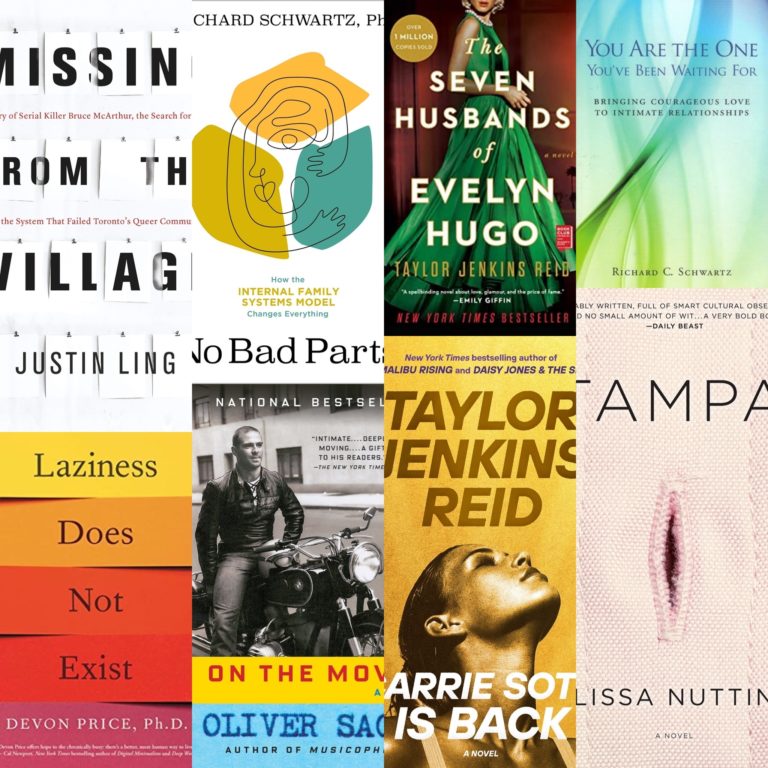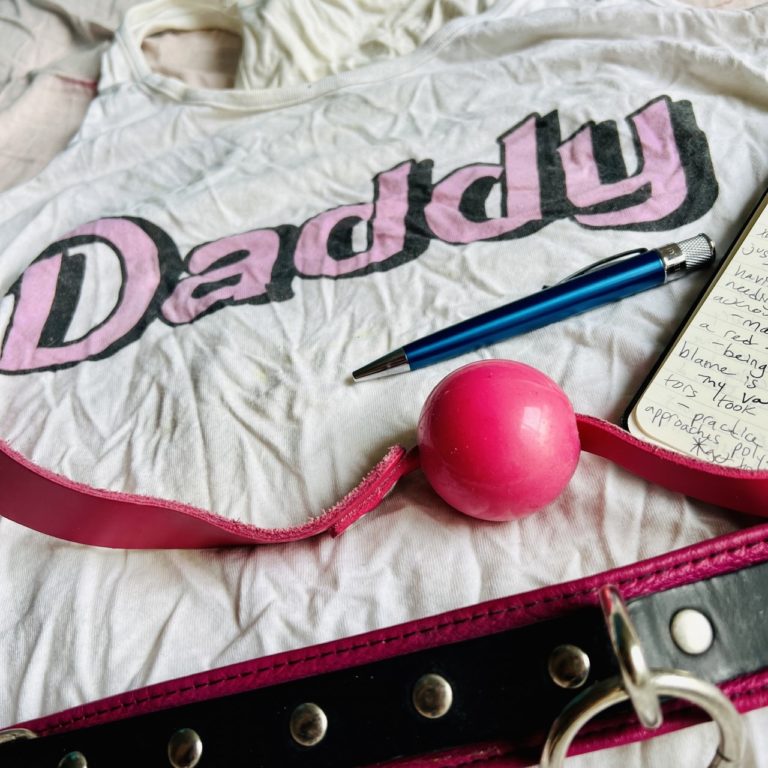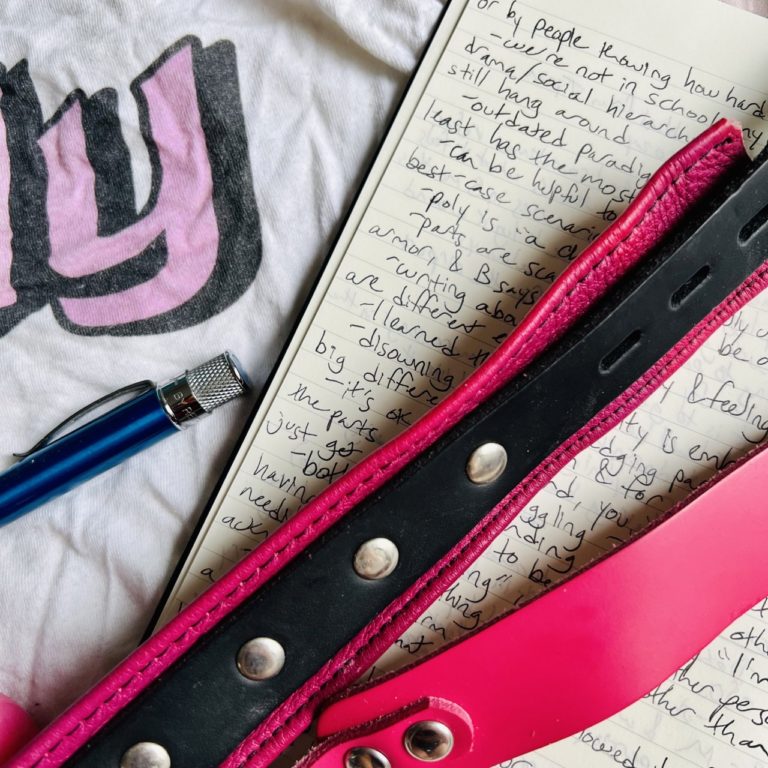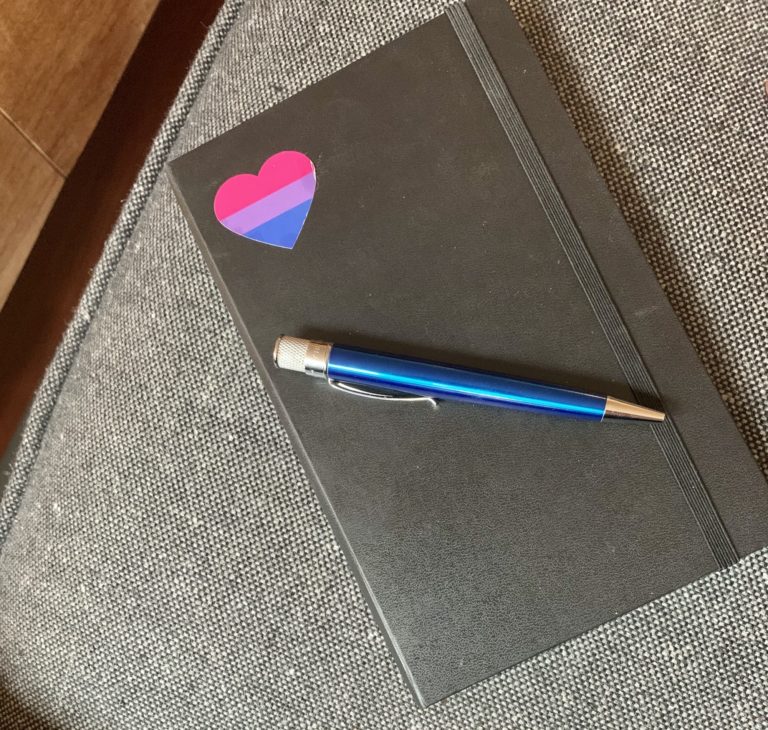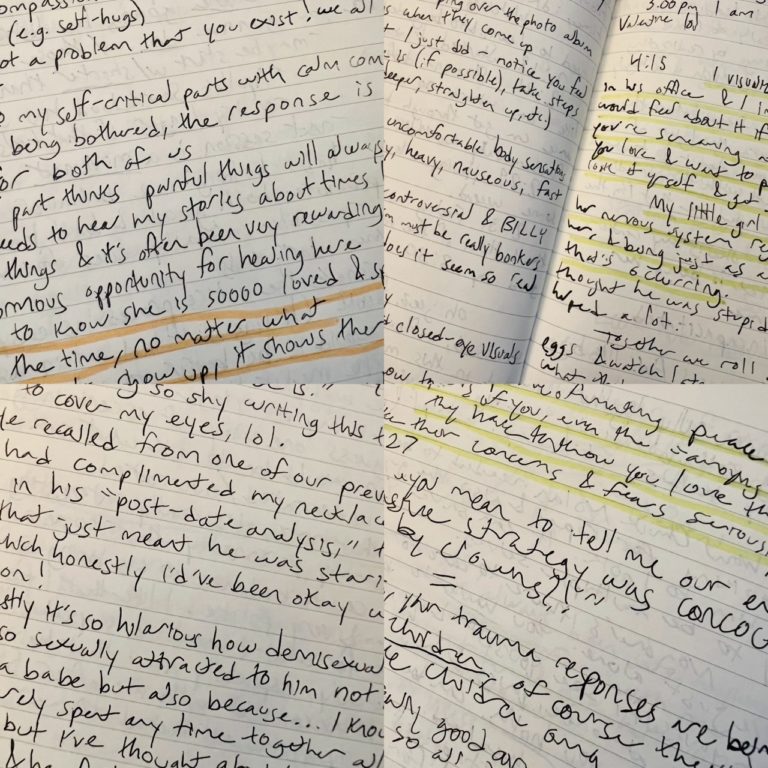
Dear friends, I didn’t write in my journal much this year; one of the occupational hazards of being someone who writes for a living is that sometimes you don’t have enough time/energy to write for yourself. A lot of the writing I did do in my journal was the many many pages of notes I tend to take during solo shrooms trips; usually I put on a movie (or sometimes 2-3 in a row) and sit in front of it with my Moleskine and pen, noting all the thoughts and feelings that come up as I watch Hercules or A Bug’s Life or Cats Don’t Dance or whatever.
So, some of the journal entries I’m sharing in this post are extremely condensed/curated excerpts from those trip notes, and some are just regular journal entries about thoughts and feelings I was having at the time. A lot of these entries also contain reference to the trauma healing work I’ve been doing this year in Internal Family Systems therapy. I hope you enjoy, and that you’re having a good December.
March 12th
Some notes from a solo shrooms trip:
All of us (all the “parts” of me) can rally together inside. Working collaboratively on a big task (like healing trauma) inherently builds intimacy. And hopefully trust. Like how Chuck Nolan (in the movie Cast Away) needed to be the guy looking for rope and also the guy who sent him to look. It can save your sanity to be multiple selves.
No one’s there to care for you if you’re just alone. You have to be able to split yourself, see yourself and your life from two angles at once, yours and hers (your inner child’s). It’s the only way you both can be cared for, protected and healed. The way I “trip-sit” myself is such good training for being simultaneously the passenger and the captain. It needs to become almost instinctual, like psychological muscle memory, for me to separate from and care for my inner bbgirl like this.
The hardest part is realizing: as a kid, you thought adults had all the answers and were never afraid, but in reality, you can be afraid and only know what you know and still decide to helm the ship. Having to calm her helps summon the most adult, nurturing parts of me to the surface. I never need to worry I’m a bad “parent” to her as long as I am listening to her, affirming her feelings, and helping her do what she wants to do next.
I spent a lot of time alone in my room as a kid because I wouldn’t trigger myself, wouldn’t monitor my own behavior for badness, or yell at myself. It was very resourced of me to be in my room alone with books, journals, dolls/teddies/stuffed animals, music, my tape recorder, my cute clothes. I found peace in solitude. But crucially, this strategy REQUIRES that I only be nice to myself, and not be the exact kind of terrorizer that necessitated my self-regulating alone time.
April 14th
Free-writing because mb told me to:
[My high school] was a place where queerness of all definitions was accepted and encouraged. It was in some ways a culture shock after 2 years at [my middle school], where social hierarchy mattered so primally, so fundamentally. What is it about middle school that brings out the meanest, darkest streaks in young people’s psychology? Is it the underformed prefrontal cortex, the impulse control issues, the lack of emotional experience that turns pimply dweebs into monsters?
There are two girls I regret having shunned and gossiped about rather than befriended in middle school. One was [N.], widely regarded as the sluttiest girl in school. We were all 12-14 years old, and there were constant rumors that [N.] dated men in their late teens or early twenties. I wonder now if she was okay, if those men were taking advantage of her; any way you slice it, they almost certainly were.
The other girl we were mean about was [K.]; she was meek but deeply funny when you got her going. She was into anime and other “nerdy” stuff like that. There were also constant rumors that she was a lesbian, and the popular girls would sometimes claim that she had been staring at them or making them feel uncomfortable. In retrospect, the homophobic anxiety was off the charts at that school, which made [my high school] seem even more utopian by contrast.
[My therapist] says it makes sense that I would latch onto the structure of “popularity” in order to prop up my damaged self-image after the emotional mistreatment I’d endured elsewhere. We naturally look for ways to feel more empowered when we go through a disempowering trauma – that’s how shame first evolves, as a way of coping with unpredictable dangers by positing that we can theoretically protect ourselves from those dangers if we behave a certain way because the problem is that we are bad – to believe otherwise would be to have to accept the terrifying truth that danger can strike at any time, for any reason, or for no reason at all.
So I can see why I got so obsessed with winning/maintaining the approval of [B., the most popular girl at my middle school] and her cronies, even though I didn’t even like them that much or want to be their friend for reasons other than social status and avoiding loneliness + ridicule. There were rules I could follow – I thought – that would help me stay safe: wear this brand of clothing, carry this type of purse, talk this way, mock these girls, express derision toward the “right” things (gayness, nerdiness, fatness, etc). I was trying to follow all the protocols and even that wasn’t enough, ultimately, to keep me safe from having my social status destroyed. But it was a lesson I needed to learn.
July 27th
Part of why this songwriting challenge has been so good for me is that I always wanted to do more gigs but so much of my best material (especially the more crowd-pleasing stuff) was from when I was in high school or my early twenties, and I feel like a pretty different person now, with different things to say and different feelings and stories I want to express (though some of the same ones as well). I’m really proud of the songs I’ve been cranking out this year and excited to have so much more stuff I can perform whenever that becomes a possibility again.
I’ve also loved observing how naturally well-suited my brain is for songwriting: little melodic, lyrical or conceptual ideas come to me all the time, like a tumbleweed blowing on down the road, and my job is to pick them up, examine them, shine ’em up and make ’em sparkle. My songwriting process now is much more adult and fleshed-out than when I was in high school, because 1) I’m a better writer now in general and 2) my spiritual beliefs around creativity now are less about accepting and reproducing exactly the rudimentary or strange ideas I hear in my head and more about using them like whispers from the universe, as a jumping-off point, an improv scene suggestion, a nudge in the direction I need to go in. I’m fascinated by the process of honing a metaphorical block of marble into a beautiful, compelling sculpture.
September 10th
Some notes from another shrooms trip:
3:07 p.m. Have to once again remind myself: you don’t need to narrate this or explain/describe your experience to ANYONE later, just enjoy it – BUT if imagining a future audience/listener is useful as a framing device or narrative theme, of course you can still use it when and if you want to.
3:15 p.m. Keeping grounded during scary scenes [of the movie I’m watching, Hercules] by writing about them. But is this always what I do? Distancing myself from the experience by documenting it? The loss of control/connection to reality that many people fear from drugs (myself included) is noticeably lurking around the edges but I am comfortably holding it off – the movie and writing about the movie are both pleasant.
3:26 p.m. Reality is bending and becoming less sure to me but in a way that’s still comfortable. Indeed, narrating this as if for a future reader (even if it’s only me) is a helpful organizing principle but also something I wouldn’t even know how to turn off in myself. What notes am I supposed to make in a NOTEbook if not for a future reader? Why am I shaming myself, bullying myself for a natural human impulse that has existed since the beginning of time itself? I am a creator, that is very core to who I am, and so parts of everything I do will be done creatively or as if they are meant to function as fuel or fodder for further creation. To pretend otherwise would be kidding myself.
4:12 p.m. Literally have no idea how many pages I’ve written this trip. The writing is less about its output and more about the actual action of it – it’s a guiding principle, a way of steering the ship, but also it is the ship.
October 29th
Some notes from yet another shrooms trip:
5:47 p.m. Watching [the YouTuber QuinBoBin] play Twilight Princess. I love him he’s so funny and wholesome. I’m laughing so hard that there are tears rolling down my cheeks.
Quin has taught me a lot about HOW TO ENJOY PLAYING VIDEO GAMES! This connection to my nerdy childhood. It’s like I was too scared of social self-judgment for being nerdy and I didn’t even let that path of my life develop. Reclaiming video games and other nerdy shit I was shamed out of. Being that nerdy boy I always wanted to impress and connect with.
5:57 p.m. VERY emotional. Shrooms is not easy or passive; do not expect it to be. But nothing is scary when I know Quin is here with me and we’re fighting the big boss together. I have to let the gay nerd inside me out. How much of my personality and style have I let [my middle school bully] shape? Who would I be without her laugh aimed at me in my own head? I’m mourning wasted time and who I could have been.
In the game Link transforms and I can transform too. I can be anything I want. My life is mine to craft now. Slicking my hair back with my tears lol.
I always used to run from Lynels [a difficult enemy in the game Breath of the Wild] or chip away at their ankles and Quin showed me I can fucking mount them and slap their cheeks til they’re dead. Nerdy boys showed me a way out of the hell of social hierarchy and I chose to swim away. I chose the hierarchy. Every mean thing I’ve ever done has been in service of trying to look cool and disaffected and like I had the upper hand. That was all an act, a crutch. I know that now.
6:21 p.m. What a wild drug, lol.
November 21st
Was just looking at some of Gaby Herstik’s incredible selfies and felt a strong sense of wanting to lean back into the side of me that would post provocative thirst traps on Twitter, dress slutty and weird every day, flirt with randos, etc. I think I have lost touch with that girl partly for reasonable reasons (fibro, pandemic, concerns about being kicked off PayPal/Instagram etc. for being too porny) and partly for dumb reasons (wanting to “seem more professional” and “be taken more seriously”). The disembodiment of trauma has also played a role.
But I wonder how much of feeling embodied and deliciously sensual is about making the effort to feel sexy by any means necessary: wearing lipstick and perfume to bed, posting late-night lingerie pics, upping my heart rate by telling cute people they’re cute.
Through therapy I have become aware of the aspects of my former sluttiness that I felt pressured into by society and people I’ve hooked up with, or felt lured into by my own trauma-borne desperation to be liked and wanted. But I wonder if now it’s time to let the pendulum swing back in the other direction a little, in the hopes of finding a happier medium. I want to feel even sexier in my thirties than I did in my twenties, and when I do, I will have earned it. This body, this confidence and this proud sexuality were hard-won for me and I intend to enjoy them. But in a way that respects my demisexuality, my trauma history and my boundaries.
During fibro flare-ups I feel so disconnected from my body even as the pains and discomforts of my body are all I can think about. I want to feel in touch with my body again and that includes being in touch with its softness, its sexiness, its allure to others and to myself.
